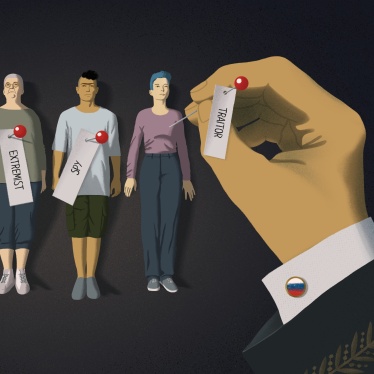Bishkek police carried out a warrantless raid on the community center of an organization working for the rights of lesbian, gay, bisexual and transgender (LGBT) people in violation of the right to freedom of association, Human Rights Watch said today.
On the evening of April 8, 2008, three police forced their way into a building housing the group Labrys, which at the time was hosting a dinner for local and international LGBT groups. Police threatened to arrest anyone who did not produce identification and searched private files at the social center, which also serves as a shelter for transgender people and women who are victims of violence.
“It’s an outrage that police can barge into a building for no reason, threaten people, and search private files,” said Scott Long, director of the LGBT Rights Program at Human Rights Watch. “Police should protect organizations defending human rights, not use their power to harass and intimidate them. The raid sends a chilling message to anyone marginalized or stigmatized.”
This is the second time police have raided Labrys without a warrant. On June 4, 2006, police forced their way into the group’s office after verbally threatening that they would rape everyone inside. The police came in and searched the place. Members of Labrys started to film to halt the anticipated violence.
According to a Labrys representative, police demanded to see the organization’s registration documents, statutes, and rent statements. After threats of arrest, the police gained entry to a locked private office and went through desks and files. A short time later, the district police chief arrived and said the officers would leave only if Labrys promised to submit its administrative and financial documents to the police station the following day. Labrys complied with the request. The raid was carried out on the night Labrys was hosting a dinner for groups from the Anti AIDS Association and Tais Plus, as well as for international partner organizations – COC (Cultuur en Outspannings-Centrum) and HIVOS (Humanist Institute for Cooperation with Developing Countries) from the Netherlands, and Gender Doc-M from Moldova.
Kyrgyz law does not require citizens to carry a passport or an identity card. Nevertheless, the police often use ID checks to humiliate and arbitrarily arrest people. The warrantless raid on the Labrys office violated the right to freedom of association as set out under the International Covenant on Civil and Political Rights, which Kyrgyzstan ratified in 1995.
Labrys was founded in April 2004 to assist and advocate for lesbian and bisexual women, gay men, and transgender people. It has been a legally registered nongovernmental organization since February 14, 2006. Labrys’ community center opened in February 2008 and serves as a place for meeting and discussion, as well as shelter for victims of violence. It was created as a safe space for lesbian and transgender people in Kyrgyzstan to meet, free from the threats and stigma they often face outside. Activists fear that the police raid will discourage many LGBT persons from accessing the center’s services.
“The Kyrgyz government can’t ignore the serious problem of violence against women,” said Long. “Instead of carrying out raids, police should protect safe places that are there to help and support victims of violence.”







